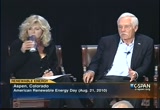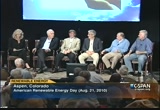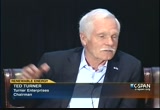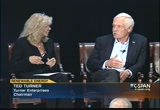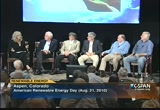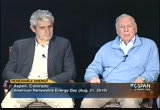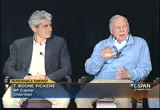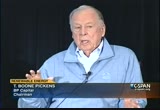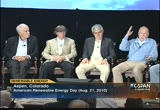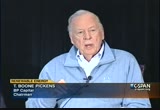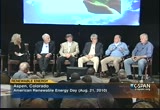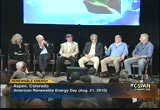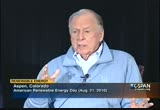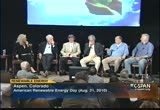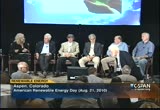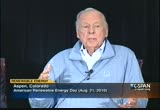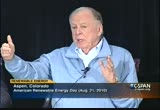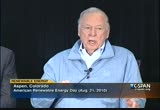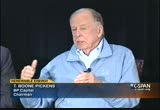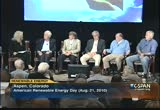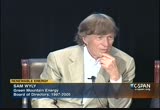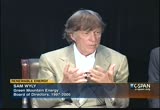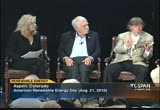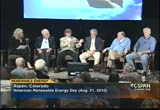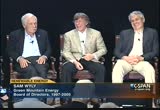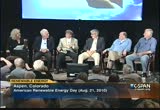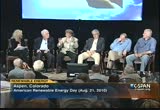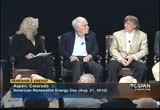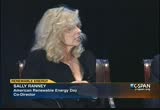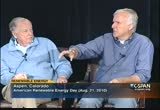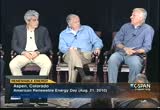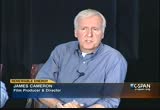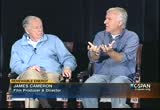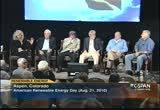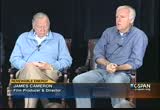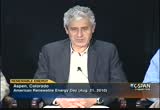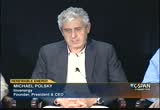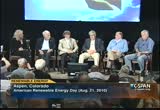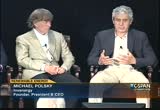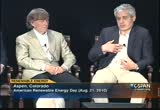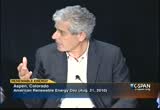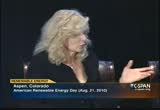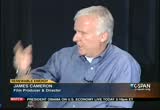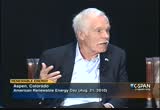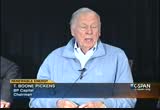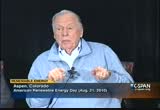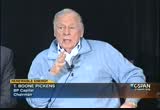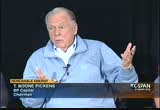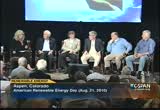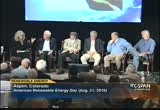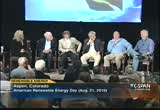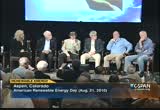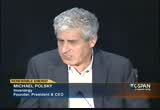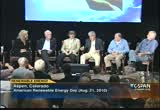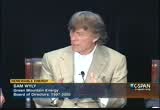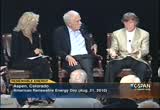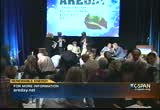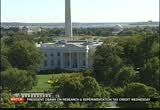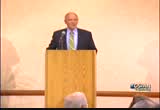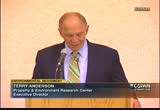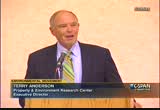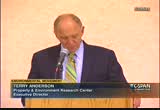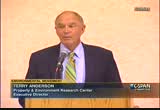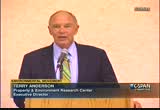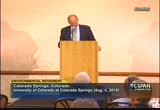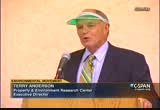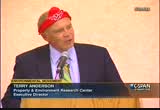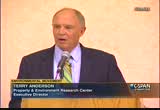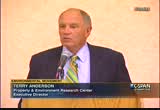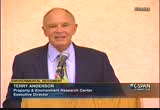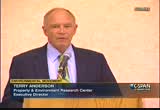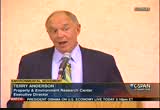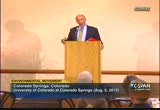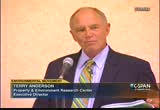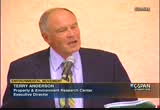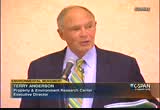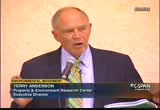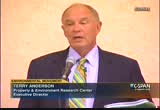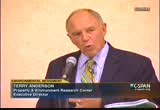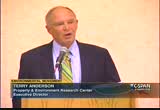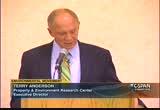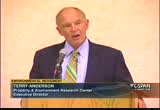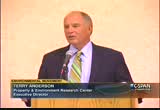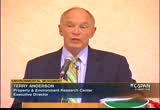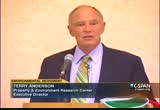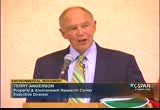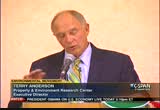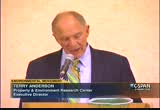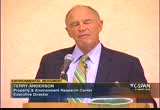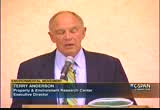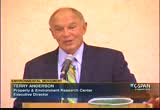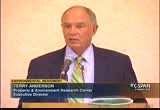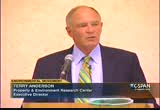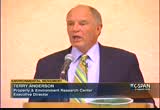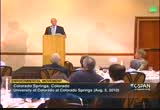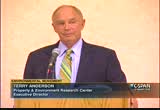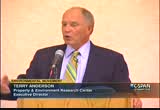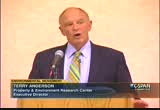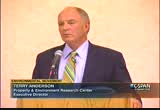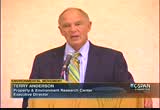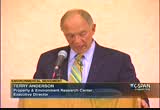tv Today in Washington CSPAN September 6, 2010 10:14am-12:00pm EDT
10:14 am
this did not just come out of nowhere. he has spent 35 years of lobbying in congress for a comprehensive energy plan for america. in he also founded clean energy corp., which is the largest natural gas company in north america. he has also have the sleet and jusheavily invested in wind. we will talk about the pickens plan and also talk about how we can reduce our dependence on foreign oil, which we talked about an hour of their session. t. boone pickens. [applause]
10:15 am
so i am going to start with ted turner. i want to know what exactly you are doing in renewals and why after all these accomplishments, you had to step into a whole nother irina. -- whole other arena. >> i believe the greatest economic opportunity for the future will be a clean renewable energy because we have to rebuild and retrofit the entire energy system in the world. energy is huge. other than do, it is the single biggest been -- other than food it is the single biggest thing we have. i want to get in there and set an example. in the united states it is not
10:16 am
easy to make good, solid alternative energy investments because we do not have a level playing field. the field is still filled with the god damn coal and. i am not board to take it anymore. [laughter] -- i am not going to take it anymore. we of a government in -- they don't have a government in iraq, and we do not either. i have a $10 million investment in mexico. it is very hard to find viable,
10:17 am
decent investments and clean alternative energy with our current laws. the laws need to be changed. we need to be encouraging to stop the things we do not want to encourage the things we do want. and we need to get on with the pickens plan and put natural gas to work for us. it is good for everything. it is good for the economy, employment. the atmosphere, the planet. if we do not do it, we will all be dead. in there are plenty of reasons to do it. [laughter] [applause] >> this next question will be a little sticky for you, because you are partners with -- on this
10:18 am
project, the summer on project. you are partners with this southern company. to go we're trying to coopt the energy. -- >> we are trying to coop the energy. the seven companies in the southeast wind and solar power, the least productive part of the country. they have to bring it in from a long way away. that means we have to have a transmission system. we have to have national standards so we can go across state lines. it needs to be implemented right now and not 10 years from now. we have to use the same kind of laws that we didn' -- we have to
10:19 am
get it done and get it done fast. i am perfectly happy to have plenty of windmills and solar panels on my land and transmission lines. i care about my country and my friends and my grandchildren more than i do about all the other b.s. [laughter] >> that is great to hear. the southern company, their portfolio is 70% coal and 50% nuclear. i hope you can move them down the trail faster. >> we're working very closely together on this solar investment down in new mexico. they're really happy. this is their first solar major investment. i am very encouraged that it
10:20 am
will not be utilities that will really stand in our way. it is just a inertia. >> t. boone, tell us about the pickens plan and why you are so passionate about it. >> my issue is security for america. we are importing 60% of our oil. let me take you back to president obama when he accepted the nomination in july of 2008. he said in 10 years we will not import any oil from the mists. -- from the middle east. i met with someone and i he said it your guard to ask him and energy company, what would
10:21 am
it be. when will we stop importing oil? obama said in 10 years will not import any oil from the middle east. if you look at the state department, they recommend not to visit countries around the world. 40% of the oil wheat imports, they recommend we not visit. and what does that tell you? they may not be friendly. why are we so stupid? we import more and oil than any other country in the world' and we import from people who are not friendly to us. the interesting part is we do not have to do that. that is my plan. a plan is get on domestic resources. what are those?
10:22 am
the biggest one that could solve the problem would be on natural gas, which is 30% cleaner than diesel. it is 30% cleaner than gasoline. california has led the way in using natural gas as an air quality to salt air quality problems for them. is it just natural gas? know. it on renewal false. -- no. -- get on renwables. they're going to start to take natural gas out of landfills. you will be able to capture gas and usage. can you use fossil fuels for ever? i do not know, maybe not. he will use natural gas. you will use ethanol.
10:23 am
those of our hours. we do have them. 52% of your power is generated by coal. do i like that? not particularly. the best use for natural gas would be to use it for power generation. it is much cleaner than coal. you will use of coal. -- you will coal. be realistic about it. and when does not go all the time, -- wind does not blow all of the time. i was in the meeting the other day, and one of the guys was eastern coal power generation. he said they are shutting down 7 other call plans this year and will go to natural gas. that is good.
10:24 am
it is happening, but it does not happen fast enough. can you make it happen faster? i am not so sure. it is moving. we have been moving in our direction, which is to get on domestic resources. and the conclusion to my point is i was at the white house to talk to david axelrod. after 45 minutes he said you have to understand yes is an answer. i agree with you. i agree with you on what you're talking about doing. we would like to have an executive to wiorder, too. give him to sign an executive order that all vehicles purchased in the future will be on domestic fuel. did of -- gett of off the stuff
10:25 am
we're getting from the middle east. we're paying for both sides of the war. look and an article written in 2009 by woosly, he clearly shows you what is happening with the money that is used to purchase opec oil. believe it are not, the ceo at exxon mobil says we of no evidence that our petroleum dollars are getting in the hands of the taliban. really? [laughter] we have had a one-on-one debate. he said none of the oil will purchase from saudi arabia, the money goes to the taliban. i said no, the money goes to the saudi arabian side, dennis to the real family, then it goes to the taliban. he said we cannot call it that far.
10:26 am
no because they do not want to call it. i can tell you that if we can try udry up the money going to , there is a lot of things that happen globally for all of us. the afghanistan war is the most stupid thing. [applause] it is horrible. 1121 people killed. i do not know how many people killed. cohwhat in the hell do we have for it? i totalked to our marine yesterday and asked him what were you doing there? thiessen my number one assignment was to make friends. we're getting people killed, that is something the chamber of commerce can do. send them over there to make friends.
10:27 am
it is idiotic. this is has been going on for a long time. i can take you back to korea. we really did not have a mission in korea. when you cannot follow an airplane across a line and shoot it down in the shooting at you because it goes into another -- listen, there's something wrong with the deal. you're stupid if you let someone shoots at you any time they want to but you cannot shoot at them. that is a weird deal. i do not know why we of 28,000 people in south korea today. what are they doing their? it does not make sense. if north korea comes down over south korea will lose 28,000 people. >> we talked the other day about national security in
10:28 am
relationship to renewalbles, and you are hitting on the points that were talked about the other day. everyone in the room realizes it is important that we reduce our dependence on foreign oil first. i have another question for you. i a party taken up -- i have already taken up too much time. that happens with age because i think i might not ever get to talk to you people ever again. [laughter] >> i have a question for you because you are so visible because you agree we need to get into herenweables.
10:29 am
colorado, wyoming, and a couple of other states have been hammered by gas exploration and extraction. western colorado point in case. you are in a fantastic position to be an advocate for regulations and protocols, best practices for how we do that so that wildlife is not affected and water not contaminated. will you take the role as you advocate natural-gas? >> pmi going to take the role of a -- ? -- am i plan to take the role of -- >> i have all kinds of things i would like to change. ted does a better job than i have done. i give ted turner credit for opening of the world with cnn. [applause]
10:30 am
those people did not have any idea what happened in the united states. you know, i do not want to say something that will lose all credibility. i have been drilling wells -- i will start this way -- i do not care how many people you meet in the oil business and the next five years, none of them will have drilled as many trials as i have -- as dry holes as i have. [laughter] we're talking about tracking on the water. >> it is more than that. i do not want to take a lot of
10:31 am
time on this because we're short on time anyway, but you are such an advocate for let's get the natural gas out there, convert 18 wheelers, let's get vehicles on natural gas, but at the same time we cannot destroy the national environment. >> i am ready. [laughter] >> nobody wants to destroy the environment, but if you look at the largest of all fire, that is from midland texas to the south dakota border going across eight states that we have drilled through, and averages from 200 feet to the surface to 700 feet from the circus. there have been thousands of wells drilled. what happened? very simple. neutral through it, set pipe, circulate the cnet back to the surface, no problem. university of it, here a bit.
10:32 am
-- you never see it, here of it. now we're talking about rifle power. i was in the peon space in 1955, that is what? 200 years ago? [laughter] i do not drill the wells because i had an override. i do not recall offer up there, if there is one. i imagine if there is any damage in the peons base, it has been probably surface water more than it has ground water. ground water is below the surface. surface water is obviously on the surface. trilling practices can take care of that. their rules and regulations are pretty clear as to how you
10:33 am
maintain a safe operation not to damage the environment. i believe that to be the case. also, the industry is looking at it very seriously in pennsylvania, western new york. we have had a lot of people that have had a lot to say. i always ask them when they say it is not safe, i say give me an instance where it has been messed up. and i am not so sure that we're listening to people -- do you listen to everyone on the environment? probably, some longer than others. hear damaging an offer, you were talking about water being 500 feet deep and the crack of being done at 10,000 feet. there is an issue of separation between 10,000 feet and 500 feet. i do not how you get back appear
10:34 am
in damage -- back up here and damaged offer. -- damage the offaquifer. >> i would like to talk about green mountain energy, sam. you started the company when the consumer was not out there for renewables. tell us about that. i grew up talking to the women in my life. i did what the women told me to do. [laughter] i had a daughter that was in the fifth grade in los angeles.
10:35 am
it was a place that crosses over the san diego freeway. it was right in the middle of the los angeles basin. and one day when i was picking her up from school she said what are you calling to do about all of this air pollution? i said what air pollution? and you look out there, los angeles is really brown. you look the other way, and you really cannot see the air. it does not look good. i got to chewing on that idea. fifth grade girls think there data can do something about most everything. what am i going to do? -- it's great girls thinfifth gr
10:36 am
daddy can do something about almost everything. looking at the electricity industry, i said basically this is characterized by state-grade monopolies in every state in america. the presentation is before us, they're trying to get people who right to dictaregulate things ao just that. my idea was to go to the people in a state where i could and offer them the choice.
10:37 am
we said what is the mission of the company. the mission of the company is to change the way that electric power is made. most electric power is made and a courteous way possible. we said let's offer the customer a choice, a choice as something cleaner. what we offer in the state of texas is you have two products. one is wind energy and brought into the city centers by air rapidly improving gradid that td was talking about. we go to the customer and say choose wisely. we offer a choice. if they wanted to secu to choose wind energy, we say it is the
10:38 am
cost of coffee a month. actually, it is a starbucks coffee. it does not take much to make the electricity cleaner. the other choice, and most people are very -- sometimes a couple of coffee is too much. we say we have an alternate products, but it is cleaner. it may not be pure wind, but made it out of a cleaner stetuf. so those are our choices. slowly we have been able to bill customers for it. not in every state. the first it was in california. we got actually killed in california. we lost tens of millions of dollars. finally we said this state don't
10:39 am
work for us. pennsylvania opened up and they work going to let someone offer something green. so we went to pennsylvania and spent millions. i still have a copy of the advertisement papers. it said no coals, no nukes. we're looking for all the customers we can get. [laughter] same store in california, which lost millions. we got killed. it was an economic failure. same story in ohio. for while we made money in ohio. they decided to change their minds, so after being profitable for a while, we are dead. then we hit the mother lode.
10:40 am
where was that? not in what people think of as the green estate in america. the state of texas. why? because they do not let the lawmakers were all the time. -- work all the time. [laughter] they only let them meet every other year. they only let them meet for 120 days and pay them $8,000 per year. they have to have a day job. you can count on it that when they do make of all, it is probably something that is pretty simple and you can understand it. -- you can count on it that when they do make a law, it is probably something that is pretty simple and you can understand it.
10:41 am
the state laws in texas look like something adam smith what right. texas was a fair fight. a lot of us rushed in. it is in a competitive market. since the great depression started in in the middle of 2007, we have grown the customer account an excess of 20% per year. we are adding customers who aren't changing their houses and businesses. -- who are changing their houses and businesses. we are probably the fastest- growing and most profitable green electric company. it is a grain company that is actually a good investment. -- it is a green company that
10:42 am
is actually a good investment. we have british petroleum as an investor. they are there with big bucks when i need them. and i know u.s. solar, wind, and hydro that you offered. >> yes. we are shopping. there are other markets. we have to say what does it cost? the markets are growing and they are big. it is different stuff. >> you are basically a retailer. i can go in on the internet and sign up, regardless of where i live. i can ask for renewable energy for my business in my home. >> yes.
10:43 am
if you're in texas, or 10 i can tell you renewable energy. in most states i cannot offer you renewable energy. that is what we did as a family in terms of offsetting our jet travel. there is a lot of us. we saved enough trees to offset the population. >> great. thank you. [applause] james cameron, you wanted "avatar" to have a deeply and
10:44 am
then dembedded environmental me, and you were criticized for that. you wanted to express that mankind has an obligation to our natural resources and to treat those well. since you have made "avatar", i understand you went to the amazon and that was very revealing to you because that is the real life situation that you came across. can you tell us about that? >> it is interesting. we were crystallized -- we were criticized mostly by conservative lagebloggers. for the most part the film was applauded for its message. i think it would be easy for
10:45 am
them to dismiss the film, except that made 2 million worldwide. for film to do that it has to be broad and deep in all markets. which means and has to fire on all eight cylinders. let's ignore this and our mental stuff, this spiritual or social responsibility aspect like it does not exist. you have to say that actually was one of the things that helped drive the film in its commercial success. i take that as hopeful that people around the world felt they wanted to have something in their entertainment that touch them and expressed the feeling for them. maybe is a thiis a sense of
10:46 am
responsibility that is not tied to specific proximal things that are hot-button issues that push people's buttons, are really something more of a general sense that we owe something back to this planet that supports us. i take that as hopeful. i am, however, a pretty pessimistic based on the what i see happening in this country with respect to the fact that a couple of years ago before the recession we had about 47% acceptance according to polls on the idea that global warming was real. now you're down to 34%. you guys all know the problem is we are moving backwards. i have heard some pretty inspiring things from this group of german that is in the trench every day.
10:47 am
they have dedicated their lives and resources to this. we have to understand with we're up against as a human race. we as a general public are in agreement in this room, but the question is how do we get this out there that climate change has to be a major driver for policy shift in this country and that a global level? only a handful of years to make a big difference before we will be playing catch-up and trying to put a bunch of bankers in the dike that will not worked. we are at a point right now were inputs that we might have a significant affect, but if we wind up trying to chase this thing 10 or 15 years from now, we will not be able to catch up. the will cost hundreds of
10:48 am
billions of dollars and be much less affected in a world that results from its is going to be a miserable place for a lot of people, i am talking about hundreds of millions of people. i have five children, the youngest being 3 years old. why focus a lot of my time, energy, resources, money, creativity, what ever it is, in to try to make a change. i will be happy to invest into renewable energy projects, but my skills said is in media and try to get people to pay attention at a public level and straight talk and speaking almost two a blue-collar mentality. i used to be at truckdriver before i was a filmmaker. i know what it's like to barely make the rent and have the day- to-day issues that everyone is dealing with. we can fix climate change on the one hand but it will work
10:49 am
against the economy. that is not answered. and it does not to be the answer even short-term. the economy will go in the toy if we are not a market leader in changing to clean energy. china will smoke us on this because they have to. they have no choice. europe is already ahead of us. it is the inertia from their right. it is an anti-science campaign. we have the average person who has a big disconnect with this issue and other issues. while consumers are perfectly happy to have these wonderful gadgets and internet and cameras
10:50 am
on our cell phones and all of that, which is all unable by semiconductors -- enabled by semiconductors. scientists brought about all of this bi methodology of understanding the natural world and the processes of the natural world and the peer review process of science is a very robust mechanism for arriving at truth. it is completely disconnected now from policy in this country and from public opinion. if we do not generate a mandate from the public up, it is pointless to rail against what the policy makers are doing because they will never do anything that the polls do not tell them to do. [applause] >> from your perspective, the
10:51 am
popular culture, you obviously are tremendous communicator through film and personally about these issues. in the popular culture, how would you continue to frame or refrained to bring science and your films in a way that would get the message across? when we have a society where lindsey lohan is the number one news draw, had to deal with that mentality? >> >> it is tough. our conventional media draws right into it. it will run with those stories. it is market-driven. it would rather hear about
10:52 am
lindsay then the grandchildren living in a world that is untenable. no one wants to hear about the gloom and doom. people want to hear about people stories. people want to hear about the people that are dedicated to this and worry about it. i think people that are generated the media product, whether this documentary films, tv shows, movies, we have to celebrate the heroes. the people that the headlights on and see the dangers coming in there doing something about it for the common good. tell the people of all the about the people making money at it. that will be more inspiring than anything. [applause] >> you and i had the discussion yesterday that was very interesting, because you have come at the renewable energy
10:53 am
industry from pretty much a straight on business opportunity. can you share that with us? >> i have been trained as an energy engineer in the late night teen 7's. bailout for private -- bailout for private ownership and an energy plants. -- they allowed for private ownership and an energy plants. i got into this business and founder died a guy who would gie money for this business. was very successful. i started another one on something i thought was a big thing to come.
10:54 am
i started in 2000 a new company. at that time we had an oversupply of energy, and the market was starting to collapse, and i thought it would be a good idea from power plants and those that had built before and had been really cheap. i sort of had a lot of development experience, and i started looking for another trend. i had never been an environmentalist. as a matter of fact, when i've built power plants, people always by you. -- fight you. people always feel to have a power plant next to you is a bad thing. and i looked around and said wait a minute. it was 2003 and oil prices started to rise.
10:55 am
after september 11 people started talking about national security. i saw a movement against coal. plus, had thought, first of all, something clean that people will not fight it. the way you deploy the projects is generally in the rural community. money would not go there otherwise. i thought this was a great thing. i thought, how can anybody fight this? so i started in 2003, and from the renewable energy at that time. i got into this field with this idea that we're going to do a lot of good things. then i realized pretty quickly
10:56 am
from renewable you generate wind very quickly. there is an infrastructure of utilities that generate from where they want and how they want and sold to the consumers, opec? i realize that even if you have the best thing, and in this country reflected chockablock market economy, how it is so market driven, and it is true. if you come up with the new gadget and product, and people want to buy it. energy is different. we do not generate anything new. there were as real note differentiation befo-- no real differentiation.
10:57 am
for a lot of people does not make a lot of difference. it is predisposed against incumbents, and you cannot sell anything. this is the biggest problem of renewable energy, despite delaware putting millions of dollars in the business, it will not go anywhere unless and until we have markets. as a businessman, i was very frustrated that lack of market. you go to utilities and to offer them cheaper. they do not want to buy because they do not make money on your stuff, they make money on their stuff. utilities are in the business to make money for shareholders and not to improve life of american people. ok, that is the bottom line. basically weak light utility tried the energy policy. and -- basically we let utility drive up the energy policy.
10:58 am
that is why at the end of the day, and the speakers repeat here, we need a policy. with energy we need a policy. we need a policy so we can break the existing system. and really create a new environment. one more thing, and we slept in the economic analysis. in this country we want to do the least cost. electricity is still the cheapest thing. i read an article that people sit for months that average family spends more money poured cable-tv and telephone been for electricity. and yet people cry if we want to increase the bill quite a dollar, there is an outcry.
10:59 am
nobody gives up their cell phone or cable company or reduce the number of channels. for the electricity somehow we were told that we do not want to pay $1 more to be cleaner, which to me, is totally ridiculous. i think that most of the consumer would pay a little bit more. [applause] >> that leads right into a general question -- what do you think is really going on with the american psyche, and calhouwhat do we really do to st the focus of attention to the things that are really important? while we have been talking about. what do we do? >> i think we have to fight
11:00 am
against the coal and oil lobbies that have such a lock on policy and creating such disinformation at a public level. we have to get people to wake up and realize these problems are real, not just national security and the economy, but the issue of climate change and what is really going to mean for them. you have to make emotional. i do not think there is a family out there that would not spend an extra few bucks a month to get better education for their kids or better health care. people really care and are protective of their children. it is part of the human psyche. if they understand that what is happening right now, what is being foisted upon them in the wake these stories are covered by the media and so one is really going to affect the bottom line help and security of their children, that is the way
11:02 am
to not worry about the fact that they do not agree with you. we are going to have to out work not opposition. we cannot outspend them, but we can outwork them. we have right on our side, which means an awful lot. if wright does not win, maybe it is best that we are not here. [applause] >> when i launched my plant in 2008, people ask me if i got my money's worth. i think so, but when you look at it, what exactly did i accomplish? i got 1,700,000 people signed up with me in the pickens plan.
11:03 am
[applause] that is a lot of people and some of you are in that army. it changed a bit as it progress. heavy on the wind, with windmills. as it unfolded and the people signed up with me, and i always had the idea to get our own resources here in america and get off of the enemy's oil. we had to do that, because i felt that that could be a disaster. as it progress, i can tell you that will lead lobby in washington now, it is common for congressmen and senators, if this works out a way that you are talking, will your army come help? you think, my gosh, they are
11:04 am
really tuned in on these people that are signed up with me. i act like the army is in the parking lot. [laughter] we have good communication, going around together a lot. i am not lying, but i do leave them to believe that this crowd moves with me. every week i bring them that update. i believe that i gave a blueprint to someone in the future and let me tell you what it is. if you can go before the american people and convince them that this is not a political issue, that it is about america and it meets the needs of generations in the future, i have got a lot of young people signed up on that. when i go to a college campus, where i have done 38 town hall
11:05 am
meetings, they come to me and they say look, we want to get on board. we realize that it is not so much about you, but younger generations, which is true, but the blueprint there, let me back up a few months in health care deal. i do not believe that the majority of the american people like the health-care plan. so, if you had someone that the people look that, they said that i was telling them the truth about health care, i think that those people could have said the american people that these were the points and you could not boil it down to the issue as easily as i could for energy. signing up with me, to read it -- to gather from the grassroots
11:06 am
they will sign up for the train. they could have signed up 10 million people in a matter of a short time. if you have 10 million people, you are talking about swinging a national election. i can tell you that that is a big ring bell with those people in washington. right now when james and says what he does and how we can solve the problems, we are at the mercy of washington. i can tell you that the biggest missing link in that crowd is leadership. it is damned near nonexistent. so, when you go there, if they like your plan and they think it is a good idea, it is usually because it will help them to get reelected. they do watch the polls. what is on the news every day.
11:07 am
not what is good for america. can i convince the american people that this should be done? that is not what they think about. they think about reelection. i do none know, we are working with a needs to be done. i think that you do it from the grass roots. >> that is how democracy works. if you work democracy, democracy works for you. deniers are very well organized, they crafted their message in a way that we have not been able to popularize in a way that you have done with that one film. last question, if we fast- forward to 2050, do you think,
11:08 am
given the problems and solutions out there, do you think that future generations will look back and say -- they got it done? they moved to the needle? >> be more specific on where to move the needle? >> changing the climate change that is coming if we do not change our energy ways. >> there will not be any statutes to george bush, you know? [laughter] will they be able to look back and distinguish the pain and misery that they are experiencing from what they could have been experiencing? that would be pretty hard to parse out.
11:09 am
40 years from now they will look back and say what the hell were you all thinking for the later part of the 20th-century? >> why did you sing aloud george bush? -- single out george bush? >> the younger. >> but why? >> years of moving backwards at a critical juncture in history. >> if you look at 40 years -- >> this might be another debate. [laughter] >> i do have real issue was on george bush, but if you look back 40 years, where can they click on that? >> on the pickens plan they can find a video. >> and jon stewart, he does a fabulous job of taking you back, all the way back to nixon, taking you back to what all of
11:10 am
them said. they all told us that we have a problem with importing oil. elect me, we will get it fixed. you kidding me? i do not care if they were democrat or republican, nobody is doing one thing to fix the problem. what is that, jon stewart, " daily show"? >> [inaudible] >> go to the pickens plan, click on jon stewart. it is a fabulous deal that he does on the energy. but i didn't know, i think that we get there. >> quickly, in the term of president nixon we were importing 36% foreign oil. right now is 67.5%. every president has even said
11:11 am
that we will get off foreign oil. and it has not happened and it has not happened because it has not come from the grass roots to make a case. >> i just want to say one thing. with energy -- and people were saying that it does not take to do things overnight, we have a huge crisis. with the global warming, despite hurricane katrina, we do not believe anything. i hate to say it, but we have that have long term policy. and that does not come from the marketplace. which is why i agree with you, people have to go to those people in washington because we need a policy. we cannot afford to do anything? this is the fundamental problem
11:12 am
here. i have gone to washington myself to tell these people and tried to convince them, they need to stay at home with their families, but they collect money from facilities, from oil companies that do not want to change things. no one listens to the american people that really want to make a difference. i feel that in 2015 we might have the same panel here, if we are still alive -- we will not be, but the human race will be, and we will discuss the same thing. >> we have the best laws that money can buy. [laughter] >> i respectfully disagree. i am far more hopeful. there is a huge disconnect between the people that make the
11:13 am
laws and the people at home that say that there is a problem with the earth created by those of us who have been here for the last 150 years. i think that they are coming to understand that there are things that can be done about it. basically, washington has nothing to do with it. loan you money to put a roof on your house, things are being done everywhere and there are millions of solutions. if i look to the policy solution, you have got to sell that for the entire world. what i have laid out in my book is what we need, carbon consumption, carrots, taxes that
11:14 am
are internal. if you hit on carbon, you get the others. in is an internal attacks in the nation but it is also an extra all tax on goods and every single town in china. you cannot get china to carbon carry, but you can do it if you can identify every iphone and ipad all over the world. american willpower is way behind other places. americans, and they will, want to do something. collectively, ultimately, we will in the world will. it is kind of like purchasing an insurance policy.
11:15 am
the cost of cleaning is far below the cost of the clean world. [applause] >> with that, we conclude this session. thank you very much. [captioning performed by national captioning institute] [captions copyright national cable satellite corp. 2009] >> wow, was that something? how about the other hand for this esteemed panel? [applause] >> we are going to leave this event to let you know that today we will have coverage of president obama, live at 3:00 p.m. eastern, delivering remarks
11:16 am
on the economy in henry maier festival park. the white house says that he will ask congress for $50 billion to kick off an infrastructure plan to expand and renew the nation's runways and roadways. we will bring you the announcement again at 8:00 p.m. eastern. wednesday, the president will make an announcement cuyahoga college in ohio to extend the research and experimentation tax credit, aimed at helping companies create jobs while increasing future productivity and growth. today on c-span, jenny thomas, founder of liberty central, the wife of clarence thomas. she talks about the problems facing america, for heroes in conservative life, and the steps that shooting should be taken to help conservatives retake
11:17 am
congress in midterm elections. coming up at 5:35. now, terry anderson, head of the property environment research center, offering a critical perspective. discussing how the movement is often misguided in advocacy, posted from colorado springs, this is about one hour. >> most people who think about this issue, environmental economics, the same way that one of the reviewers spoke of my book, "free-market environmentalism is an oxymoron
11:18 am
in part." i hope that you will not think that when i am finished. but i do not want to talk to about greener-than-thou. no one can live in this day and age without encountering that word, green. you might remember that kermit the frog said that it was not easy to be green. but today it must be easy, someone might say, because everyone is. when you pick up in newspaper or magazine, you cannot help but find some statement about greener-than-thou. republicans and democrats often disagree on many policies, like foreign affairs, trade, minimum wage, you name it. but no politician says that i am
11:19 am
not greener than you are. i can one of you with my environmental policy on the environment. i knew a former british petroleum c4eo and i used to -- ceo and i used to joke with him that bp just needed to paint their sign a little greener. although that would not work today, no doubt. still, corporations are always talking about being greener than their counterparts. i do spend time at stamford and if i am there in the spring, i tried to go through at least one san francisco giants camp. harder to get baseball in montana. i remember watching from the stadium two years ago and going up to get some garlic fries. the subtitle under the marquee of the garlic fried distribution was -- the first green concession stand. i was thinking, how do you
11:20 am
become a green concession stand? we have green television stations, green termite killer is, green cards, ecological worms, the co-fashion, you can cut -- eco-fashion, you can put eco in front of anything and someone will be greener-than- thou. how do you know? how do you show that you are greener than the next person? are you really? here is one. i read a delta magazine recently while i was flying, they replaced 500 sheet rows of virgin took the paper, not sure what that is, therefore leaving 424,000 trees standing. does clean toilet paper leave
11:21 am
trees standing? an important question, since most trees are grown today are wrong for one purpose, to produce pulp to be turned into paper. so, if you recycled paper and use green toilet paper, are you saving trees or killing trees? do those lands that would have resulted in pulp for paper turn into soybean fields? or subdivisions for wall -- wal- mart parking lots? how do we know if using green toilet paper is as green as it sounds? of course, we all know that ethanol is a great boon to the environment. it will allow us to burn fuel is that we grow right here at home. unfortunately, as it was subsidized and farmers began to
11:22 am
plow up to the edge of wetlands and streams, people began to ask out green and was. it sounds good, but is the result that dream? have you ever heard -- paper or plastic? which is it? how do you decide which one is clean? supposedly the paper is green and the plastic is evil, but is it really? which one saves the precious plan that -- planet and its resources. i will show you these wonderful pictures of i had my our point of a car on the stanford university, it said an electric car, no pollution. gosh, think about it. a car that generates no pollution. how does it get howard? electricity. how does it get electricity? plug that into an outlet.
11:23 am
coming from no other than a coal fired plant, that electricity is coming from. is that green or no? how about walking instead of driving? no one can question that walking is not greener than driving. but wait a minute. i read one study that said if you look at the mill it takes to replace the calories it takes for walking 1.5 miles, it generates more greenhouse gases then driving your car 1.5 miles. so, how'd you know? what were dry? of paper or plastic? those of us that our economists think we have a bit to add to this debate, but if you think
11:24 am
that kermit the frog has problems, imagine thinking of yourself as an environmental economist. i appreciated jim's comment, he did not give me one of the more typical jokes i get when introduced. you know what an economist is? you are obligated to say no. the answer is that an economist is someone that is not good with numbers but does not have enough personality to be an accountant. how will you then be an environmentalist? to wear this hat and suggest that you have anything at all to say about the environment is about as much of an oxymoron as the reviewer of the book implies. do economists have anything to offer to this debate? obviously i would not be before you if i did not think it we did, so i wanted to talk a little bit about why it is so
11:25 am
hard to be green. to show you that i absolutely have some credentials, i will put on my environmentalists hat for this part of the discussion. it is actually very useful. not only does that of george sweat, it can be unrolled to cover some of the parts that have no coverage at my age. i remember going onto the beach with my son when he was younger. i looked down and i asked what he had on his head and he said hair. [laughter] the answer that you want to give, not that one if you want to be in the will [laughter] ] what does an environmental economist have to offer to the debate? in answering that question that want to talk about why it is construed to be so hard to be an environmentalist and an economist.
11:26 am
first, let me talk about how economists view everything. we put on those glasses, and they tell us about the benefits and costs. how can you evaluate the environment in terms of benefits and costs? we are always thinking about the benefits and costs. let me give you an example of something that i think illustrates this clearly. how many of you would like to have arsenic in your water? almost anyone that hears that word gets this image of an agatha christie murder mystery where the butler has just scored a little bit of arsenic into the water and the person keels over and dies. well, we do not want our sncc in our water and we have a clean water act that specifies just how much can go in the water. turns out there are many towns in montana that are in violation
11:27 am
of the clean water act. they have more arsenic in their water than is allowed by regulations. you might say, gosh, i would hate to live in one of those towns. the arsenic in that water is terrible. you know that if you drink enough water from the source, you could increase your chances of cancer by one in 10,000. you might say, is that a big risk or not? turns out you have to actually drink a fair bit. 1 liter of water every day of your life for 70 year in each about 1/4 pound of fish every day of your life for 70 years. then you will increase your chances of cancer by one in 10,000.
11:28 am
first of all, if you live in montana, you are not eating fish, your eating red beef. after a certain age in montana, you are not drinking water, you are drinking beer. [laughter] but it turns out in -- and this standard is so bad, not far from there is a town called three fourths of montana, the arsenic is out of compliance and that town is being required to spend money cleaning up the arsenic. when i heard this, i thought -- my gosh, is there a company dumbing the arsenic in their water? digging further, i found out it was not the mining. the river is out of compliance because there is a major polluter upstream. yellowstone national park. the arsenic in the missouri river comes out of yellowstone
11:29 am
park geysers, it has been doing so for as long as anyone, as old as i can remember, i can remember. possibly before that. we will now force them to put in water treatment facilities that will put -- take natural arsenic out of the water, so that the people will not increase their incidence of cancer by one out of 10,000. if you are an economist and use about that, you think you have discovered the holy grail. i have told the people how to use benefit cost analysis. but if you say that that much suggests a dense water quality, it sounds as though you cannot be an accord -- an economist and an environmentalist. let me touch on global warming for one moment to let you know that if we were to rollout -- go
11:30 am
out and implement today and put into place all of the cutbacks that were suggested, we could reduce global temperatures by the year 2100 by 1/10th of 1 degree celsius. do you have any idea of the cost of meeting the kyoto protocol? not only would we not eat meals the way that we just ate, missing the life standard we are living at, developing countries would remain that or worse. so, the economist asks, is it worth that much money to slave one so -- to save 1/10 of one degree? the copenhagen consensus,
11:31 am
organized by "the skeptical environmentalists" author. yes, if you were going to spend that kind of money, where would you spend it? reducing global warming or other things? some of these economists look at these issues and said, well, if you are going to spend that much money and you care about saving human lives back, do not bother with carbon emissions, spend it on reducing malaria. that will save weight more lives give up on carbon emissions to save lives through malaria here? should we not do both? economists are not very good that.
11:32 am
when we look at the cost of one for the benefits of the cost of another, taking that perspective you are not actually won over as a friend of the environment. it is also argued, how can you be an economist and a friend of the environment? our economists not only interested in gdp? is that not what economics is about? driving everything forward for more goods and services? how crass can you be, being an environmentalist if you have had of an economist. the answer is, first off, economics is not completely focused on getting people richer in the materialistic cents, it is concerned with how people, especially individuals, get to satisfy their own desires with
11:33 am
their own devices. how do we take our mostly human capital and convert it into things that make us feel better? happier? whether it is sitting out over a mountain top and writing poetry or working in a factory is up to you, but that is what people are about in terms of prospering. let me continue to be crass. suppose we are only focused on economic growth, what are the implications? implications come from data that shows that if countries grow, eventually one of the things that happens is the environmental quality follows. admittedly, there could be a time when you are a little hungry and you do not have much for clothing, you do not have a
11:34 am
good house, no transportation and very little health care, you might ask yourself if you would cut down a few trees even if they take away wildlife habitat? no doubt about that. at some point, have to backup and say that reminds me of being in rio de janeiro in 1992. some of you may not be old enough to remember 1992, i remember teaching and asking about the energy crisis of 1974. the students look at me and said no, they were not born yet. bear with me. a group of us were in a cab. we were going to do some shopping. it was a rainy day just before the earth summit. one of the first really global discussions of a global warming
11:35 am
issue. as we were driving across, we would come to these intersections. the military without practicing for these dignitaries that would be there. these cab drivers would try to turn right, but they would have to go straight to correct the course. in the backseat we are oblivious. finally he comes up to a stop sign. [unintelligible] i thought that that captured it. we are obviously going to spend our money on semi-precious stones or whatever. he is thinking -- my guess, you are part of a group that is going to tell me that i cannot earn my income? he wants more in common, he does not care about global warming.
11:36 am
none of that matters. at some point in the process perhaps we will not get more quality, but study after study shows that at some time there is a turnaround. when that cabdriver finds that his housing gets a little better, with slightly better medical care, he might say, you know, i would like to have some clean things in my environment. the first thing that happens in the developing world is cleaning up the water. turns out that is one of the most important in those of us who are wealthy have an obligation help but go on at a faster rate. but he will that do get better
11:37 am
help to improve their environment. it turns out that there is a really important nexus between the two. another criticism of the economists, especially the free market types, you say that people should get to do whatever they want and it does not matter, regardless of the consequences. so, the solution is that if you are an economist and you like the free-market, you think it should broaden roughshod over the environment. if you can produce more and stuff comes out, tough. to the contrary, free markets depend on institutions to hold people accountable. most importantly, they are what economists think of this property rights. which is to say that if people have a property, they get to use
11:38 am
that property, except in ways where it might harm the profits of others. property rights become a crucial part of getting people to be accountable. at my institution, we are interested in property rights the best chapter title i ever came up with the title, and you are if you get banged up. if it was your car, you would probably if i do not dumb --
11:39 am
dump my gunk, you can see me in court. when it holds it is a way of making sure that people take care of the environment. take the recent oil spill in the gulf. who is liable? bp is finding out that they are going to be held accountable and that is a debatable question, but imagine if you own to the fisheries in the gulf and they were used -- a were yours, and you know being the way you are,
11:40 am
pay up. or otherwise it would be in court. the bottom line is that property rights are a crucial part of the vulnerability, free markets, and environmentalism. finally, i would say that economists are often criticized because of the notion that somehow markets do not take good care of our natural resources. that we over use them, exploit them, use them until they are completely depleted. to the contrary, we can also focus on how to get the incentives right to have people
11:41 am
be cognizant of scarce resources. the best way to understand this is a rather famous, the pending your size -- depending your side of the debate, between julian simon and paul ehrlich. julian simon unfortunately died too young and was not vote -- was not around to continue. he was known for being a cornucopia and. a person who said, and not do not worry, be happy, but he did have a phrase -- with every wealth comes two hands and a brain. -- with every mouse comes two hands and a brain and it is that brain that allows us to overcome scarcity. he wrote many books and articles
11:42 am
about how markets discipline us. paul ehrlich, on the other hand, said that we would run out of natural resources and that the result would be that we will ultimately run up against these constraints. he made a lot of converts in his book. riedl the jim wright along these lines. never mind the fact that we have not run out of any of those resources yet. nonetheless he continued to put this forward. in a debate between the two, julian suggested that it might be useful to put your money where your mouth is. julian wagered that he was
11:43 am
right, namely that we had an ability to deal with resource constraints, that the result would be that we would expect to see not only resources going up in price, we would expect to see resources going down in price. if we found ways to utilize the resources at hand, it should result in less scarcity, not more. he rarely left himself off the podium at this notion. julien said -- i tell you what, let's bet $1,000, up eight the resources that you like, i will bet you that the price goes down. if you are right, the price goes up. we will purchase a hypothetical amount of these resources. with it that bundle, we will see. if we bought $1,000 today with
11:44 am
they be worth 1500 or 500 in the future? not only have those resources gone down in nominal terms, there have also drawn down when adjusted for inflation. in other words they were not getting more scarce, they were getting less scarce. paul ehrlich had to pay julian simon the difference between the $1,000 that they that and the value of the resources at the end, which was slightly more than $400. at that point, julien said let's double the stakes, let's to $10,000. ehrlich refused and said that his problem was that you are the man that jump out of the 100 story of the building and you are just passing the second story and everything seems just fine to me, suggesting that when you hit the ground, it would hurt it lot.
11:45 am
taking that enology, it would indeed heard a lot, but jillian responded that we as human beings keep finding better ways to deal with this. the data is on the side of the economists who say that prices matter. there is a footnote here, i might for a vote that was just out and title "the rational optimist." it captures much of what julian simon was about, essentially making the same argument by suggesting that the evolution of prosperity for human beings came about because we had learned how to utilize specialization trade four key aspects of markets. so, is there any way to capitalize on all of this? making sure that it will lead to a better and healthier future environment?
11:46 am
is there any way to mix these upper in a way that will keep leading to economic prosperity and quality? let me just give you a few ways that go in this direction. first off, think about public land here in colorado. surrounded by thousands of acres. throughout the west we have federal lands that make up as much as 90% of states like nevada. those public lands, worth billions of dollars, they lose billions every year. they are able at big reliability to was. there are places like yellowstone and the rocky mountain national park, i say -- what treasures. why do we treat them so poorly?
11:47 am
i would not go to yellowstone at this time of year on a bed. it is overcrowded and anyone that goes there agrees. if you have ever gone there in the middle of july or early in august, you will have trouble getting a picture of the guys are, you will get a picture of the glare off the back of my head. is that deep with tourists. all of our national parks have huge deficits in terms of maintaining the infrastructure that we have. they are huge liabilities. why? basically, we are not willing to pay for them. we are not willing to pay for them through taxation. and you think we will be more willing when paying for my social security? forget it.
11:48 am
it will be harder and harder to find the money from the federal government to take care of our precious assets. what might be due if we put on the environmentalist pat? the answer is to put your money where your mouth is. pay some fees. if we were to reorganize the way that we fund those resources, we would do it in places like kenya. i had the good fortune visiting kenya about one year ago and a part of the agreement was that his friend who had organized the trip said that he could arrange for me and my friends to stay there for nothing. we would give free room and board. i said that it sounded great. he said all we had to do was pay the entrance fee to a national park. who could afford not to do it? we pulled out of the gate at the
11:49 am
national park. beautiful, mountain territory. spectacular habitats. k buffalo, wildlife everywhere. i reached in for my $20 bill and we were told that we had to pay for the driver, the friend, and wife. the complete bill came for $360. it was still a good deal for me, i got to stay at a wonderful laude, but $460? why should i not pay $460 to get into such a treasure? they have got it right. maybe we should think a little bit about ways that we can convert those precious public lands into public lands that are not only not liabilities, but treated the way we should treat assets.
11:50 am
if we had systems where we actually use markets to allocate even a share, i would submit that we would have much better care of those public lands. endangered species are something that we all get upset about. my gosh, we are losing this species or that species. but think about how we go about taking care of them. i have a friend who is a rancher in central montana. a spectacular ranch that is for sale and i am looking for people to join me in buying shares. $45 million, i think. if i have the calculations right, purchasing an acre costs only $750. if we can just find 59,000 people to join me, we can buy the entire ranch.
11:51 am
a spectacular ranch that has been in the family for decades. the owner of this ranch said that this is a stream that used to have fish in input. when lewis and clark came through, they recorded that. he said he wanted to reintroduce them into the stream. trout unlimited, an organization that cares about fish, they said they were with him, they would do anything they had to do to maintain the stream. they were all set to go. ready to dump buckets in the stream when a friend of his said -- are you nuts? if you put those in their, and there is a good chance they are listed as a threatened species, your cows will never take another sip out of that stream. you think he reintroduce them? no way.
11:52 am
he said he was not touching it. this man cares more about the environment than anyone in this room. he was not about to except the liability that he had if they were reintroduced. there is some good news at the end of the story, recognized this, we have created safe harbor agreements. if they help to preserve the species that did not exist before, they will free the responsibility that would come if the species was listed. if you take a positive action to put them back, you will not be told that you will be regulated for your cows. i am happy to report that this supreme now has railing -- fish, lewis and clark would be happy.
11:53 am
you may have heard the term cap and trade. if you have not, you are deaf and probably cannot read. it is usually talk about in the context of reducing carbon emissions. i am a bit skeptical about that and i am happy to take questions on it, but for now let me tell you how it works. it goes the following way. submitted into the environment, let's say north carolina. we have phosphates and nitrates being put into the sound. fisheries are being harmed. water quality goes down. a quiet life is not in good shape. the question is -- how do you remove these pollutants? we would tell those people to cease and desist, meet our
11:54 am
standards. clean up the crap going into the cell. the committee said, look, we are meeting the standards and are as down as low as we can go. if we are going to go anymore, it will cost millions and millions. what are you going to do? fortunately, there are some environmental groups that are quite innovative, giving credit to the nature of the environmental defense fund, they said maybe there was a better way. what about a cap and trade system? what if we say -- all that we care about is if you reduce emissions here.
11:55 am
everyone knew where most of it was coming from. hog farms up river. they were not easy to regulate and were not something which you could go and identify, and telling people will cut emissions control devices on the end. the question became -- how could you get these people to control emissions? the answer -- the groups that were downstream being pointed to said they would put in a little bit of money and offer it to the hog farms if they will reduce their emissions so that we do not have to. it took almost no time whatsoever for them to come into compliance with standards that costs that were way below what it would have cost if we had followed a standard regulatory approach. today we talked in our sessions about watermarks. there cannot be any question
11:56 am
about whitewater is so scarce. we use the water as if it is cheaper than dirt, because it is for those of us that use it. if we could create small water markets, we could move water from relatively low value to relatively high value uses, getting rid of a good deal of the misallocation between urban, industrial, and agricultural uses, and improving the environment. in washington, idaho, and montana, the focus on using markets to improve the flow, purchasing water, they are doing it without the high and dry result, without driving up the agriculture. it can and will work if we give
11:57 am
them a chance. can you expect this -- i will wrap up with this -- can you expect this to happen if you turn it over to your local politician? hold your breath and you will not look long -- you will not live long if you wait for that. these incentives are not part of the equation. cleaning up arsenic is what it is about, and if it costs the city money, that is the problem for new board. or maybe we will throw them a subsidy, in which case it is your problem. politicians are not likely to bring forward market reforms that will make this happen. if you do not believe that, fine, go search for a politician that says we should raise national park prices and leave the fees there and so on. if you really want to be green, it will come from the bottom up.
11:58 am
coming from places where the people that see the benefits benefit from the cost, taking those into account. here is where i take off my hat to the local land trusts. across this country, land trusts have exploded and they have exploded largely on the local level, with one exception, the 900 town morello in the room, the nature conservancy. even as big as it is, it has kept its focus on doing things at the local level by asking -- how can we reward private landowners? how can we bring them into the equation to improve environmental quality? it is doing that that will make a screen. if you are willing to put your money where your mouth is, stating that habitat that you care about, saving that creek in
11:59 am
the backyard, or if it is just to save open space, those things tend to be saved better, more efficiently, and more quickly if we start at the local level. the bottom line is that we need to find ways to make us all more accountable for the help the environment. if we can do it at the local level with local funding, all the better. here we cannot resist looking at t.j. rodgers, now manufacturing solar power systems. at the time,
99 Views
IN COLLECTIONS
CSPAN Television Archive
Television Archive  Television Archive News Search Service
Television Archive News Search Service 
Uploaded by TV Archive on

 Live Music Archive
Live Music Archive Librivox Free Audio
Librivox Free Audio Metropolitan Museum
Metropolitan Museum Cleveland Museum of Art
Cleveland Museum of Art Internet Arcade
Internet Arcade Console Living Room
Console Living Room Books to Borrow
Books to Borrow Open Library
Open Library TV News
TV News Understanding 9/11
Understanding 9/11
